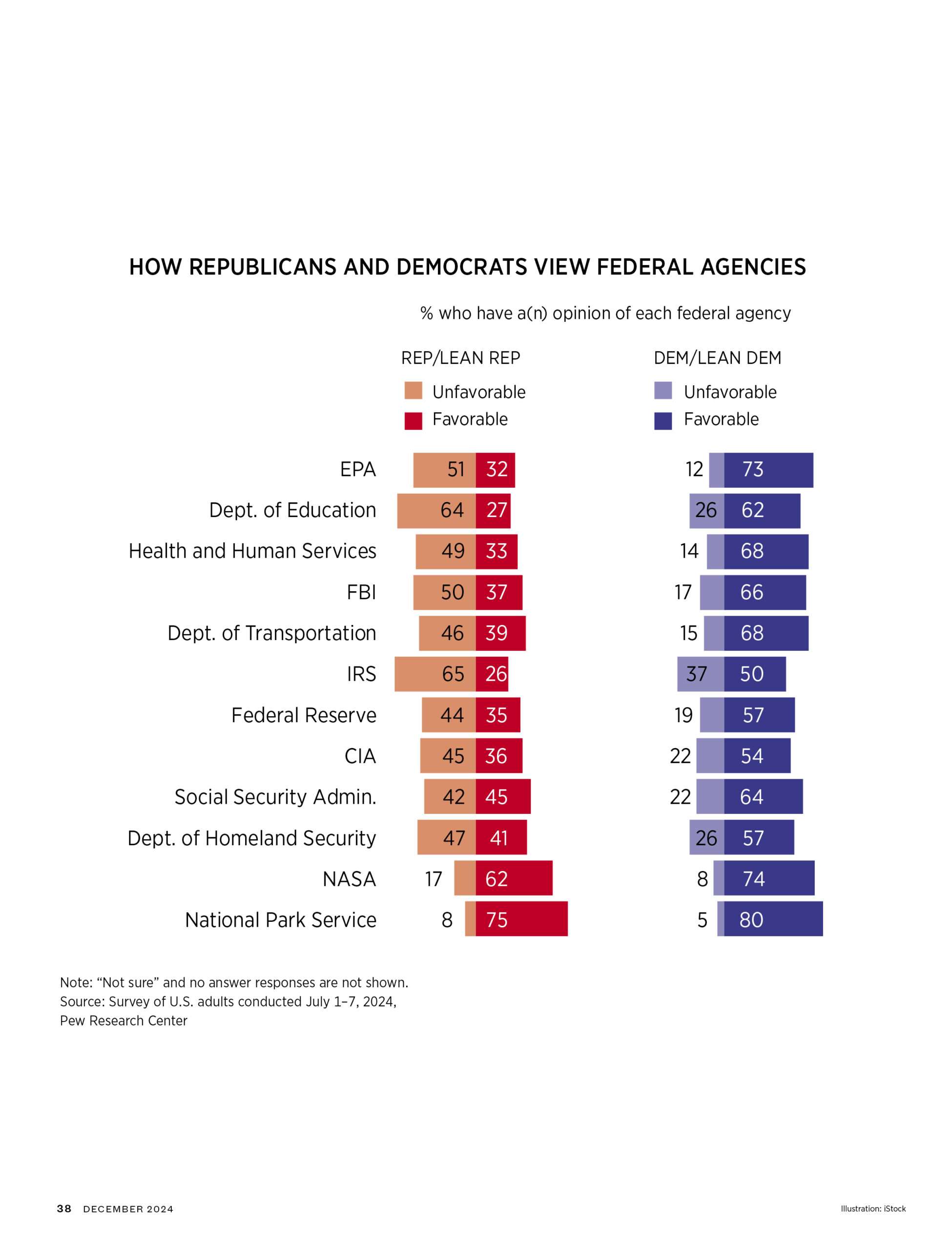Infographic: Perspectives of Republicans and Democrats on Federal Agencies
To create a summary based on the theme of how Republicans and Democrats view federal agencies, here’s a structured response following the guideline of 2000 words and six paragraphs:
—
The differing perspectives of Republicans and Democrats regarding federal agencies reflect broader ideological divides in American politics. Republicans typically advocate for limited government intervention, emphasizing fiscal conservatism and efficiency within governmental operations. This viewpoint often leads them to favor reducing the size and power of federal agencies, which they argue can be bloated and inefficient. The perspective tends to align with a general skepticism about the role of government in handling economic issues, prompting calls to shrink agencies or implement stricter oversight measures to eliminate perceived wastefulness. This approach is grounded in the belief that the private sector can often manage services and functions more effectively than government entities, which they view as susceptible to bureaucracy and corruption.
In contrast, Democrats typically hold a more favorable view of federal agencies, seeing them as essential instruments for enacting social welfare programs, protecting civil rights, and advancing public health and safety. This party’s perspective emphasizes the role of government in addressing systemic issues such as inequality, healthcare access, and environmental protection. Democrats generally defend the existence and expansion of agencies that work towards social justice and environmental sustainability, arguing that a robust government presence can help rectify market failures. They often perceive federal agencies as vital in safeguarding the well-being of marginalized groups, providing necessary oversight in areas such as labor rights, consumer protection, and environmental regulations.
The polarization between the two parties on this issue is exacerbated by differing views on the effectiveness and purpose of government. Republicans often highlight instances of agency overreach, suggesting that certain federal offices infringe upon individual liberties and state sovereignty. They argue that decisions affecting local communities are often best handled at the state or local level, advocating for policies that promote federalism over centralization. This perspective can manifest in opposition to regulatory measures enacted by agencies such as the Environmental Protection Agency (EPA) and the Department of Education, which are viewed as imposing unrealistic or burdensome rules on states and businesses.
Democrats, conversely, often respond to these criticisms by emphasizing the accomplishments and protections that federal agencies provide. They advocate for the necessity of extensive regulations to ensure public safety, economic fairness, and environmental sustainability. For instance, Democrats tend to support the work of the Occupational Safety and Health Administration (OSHA) and the Food and Drug Administration (FDA), arguing that they play crucial roles in maintaining standards that protect workers and consumers alike. This partisan divide illustrates a broader tension between differing electoral bases and their constituencies, as well as their historical narratives surrounding the role of government in society.
The media plays a significant role in shaping public perceptions of federal agencies and influences how party members assimilate these views. Coverage often emphasizes partisan polarizations, leading to starkly different portrayals of the same agency’s actions. For instance, when federal agencies are involved in taking controversial actions, Republicans may frame it as governmental overreach, while Democrats may argue for the necessity of the agency’s intervention. This dynamic not only reinforces existing partisan perceptions but can also affect how citizens engage with these agencies—possibly leading to increased mistrust among conservative constituents while fostering support among liberal communities.
Ultimately, the divided views of Republicans and Democrats highlight the complexities of governance in a diverse political landscape. As each party continues to advocate for its vision of federal agency functionalities and structures, ongoing debates surrounding their roles will carry implications for future legislation and policy decisions. Understanding these differences is crucial for interpreting the broader spectrum of American political engagement, fostering dialogue on the importance of federal agencies in addressing contemporary challenges, and promoting a more informed citizenry that can navigate the complex terrain of governmental interaction.
—
This summary encapsulates the views of Republicans and Democrats on federal agencies, emphasizing their differing ideologies and the implications of these divisions in American politics.
Share this content:












Post Comment